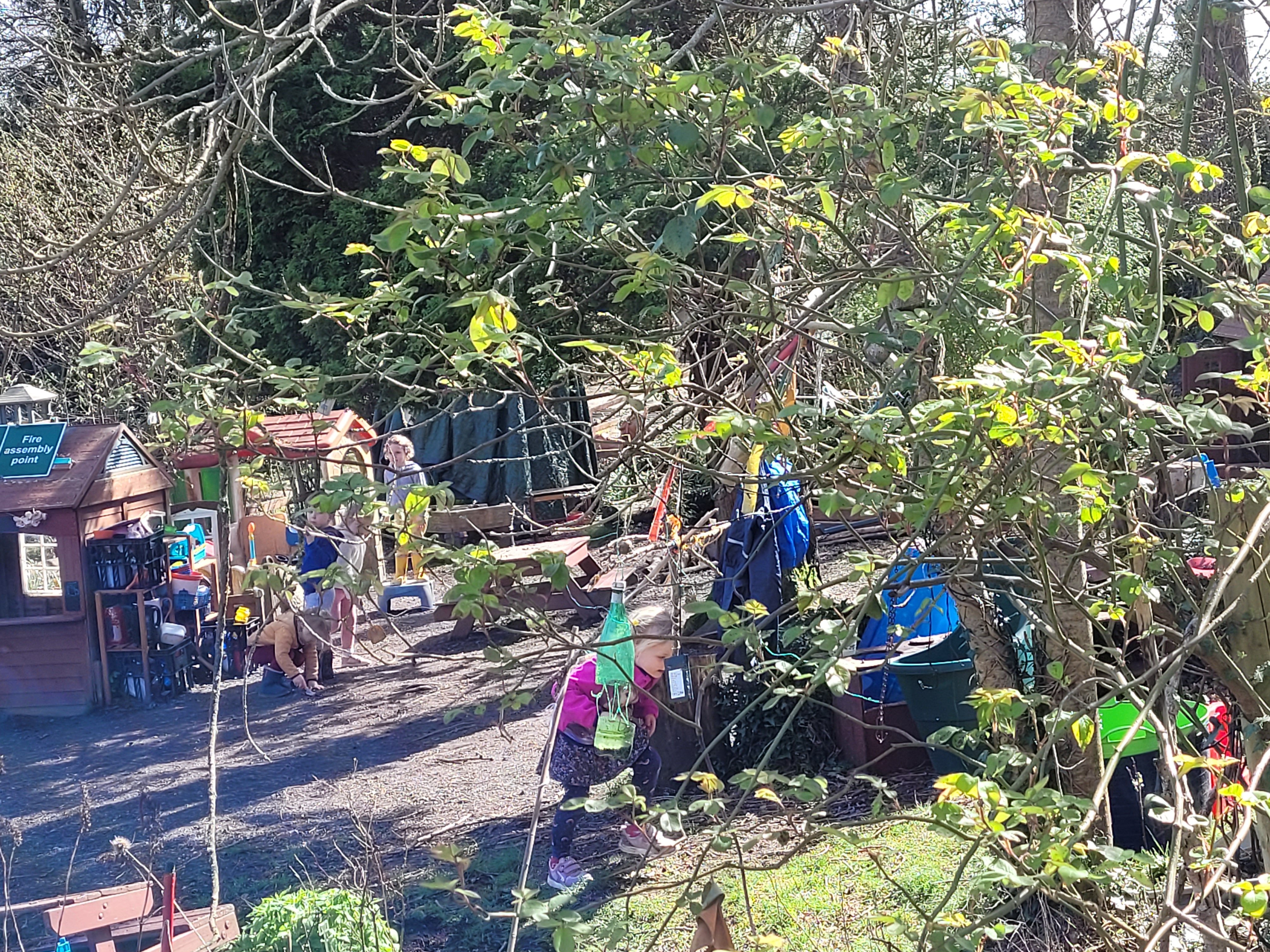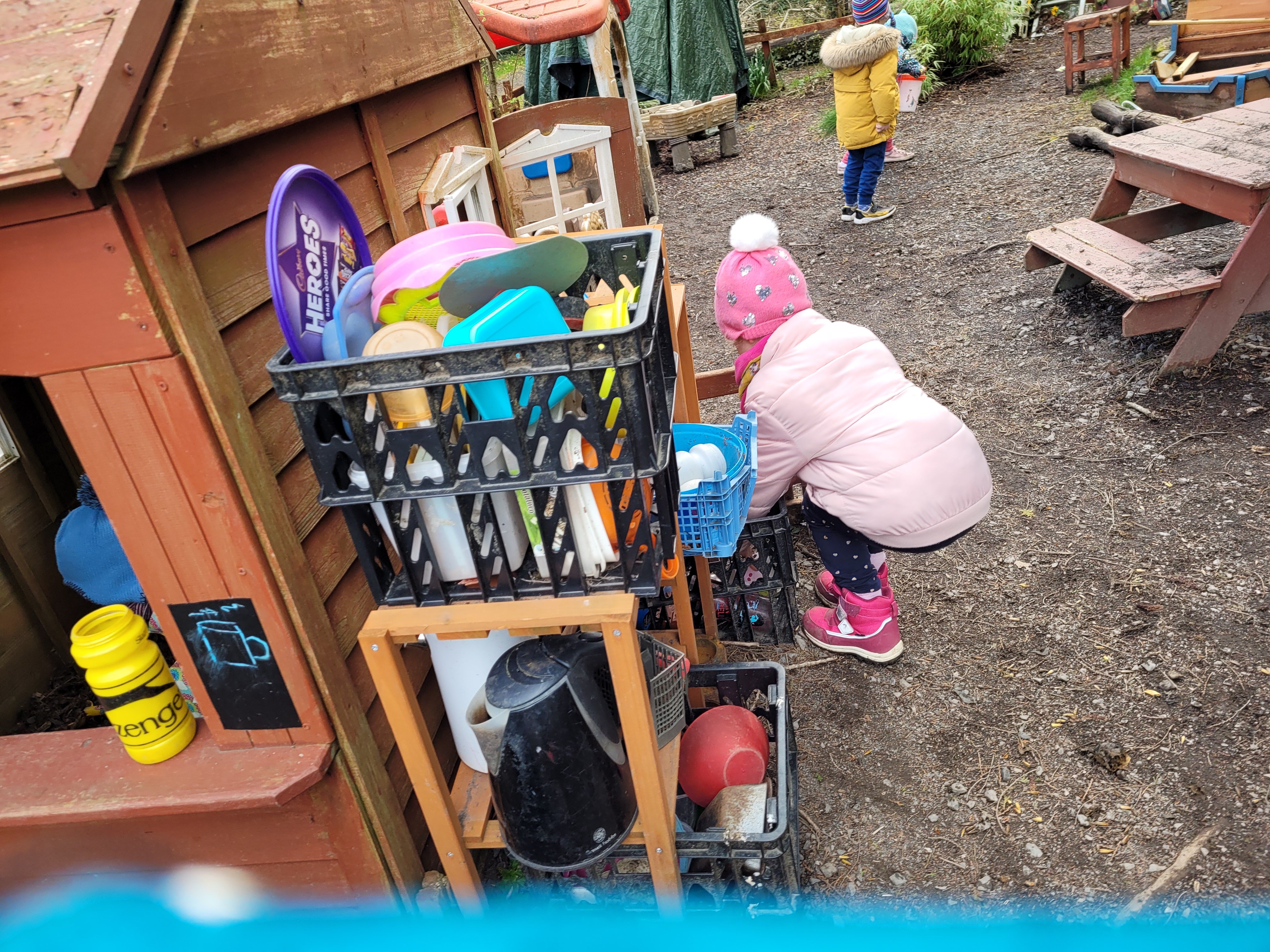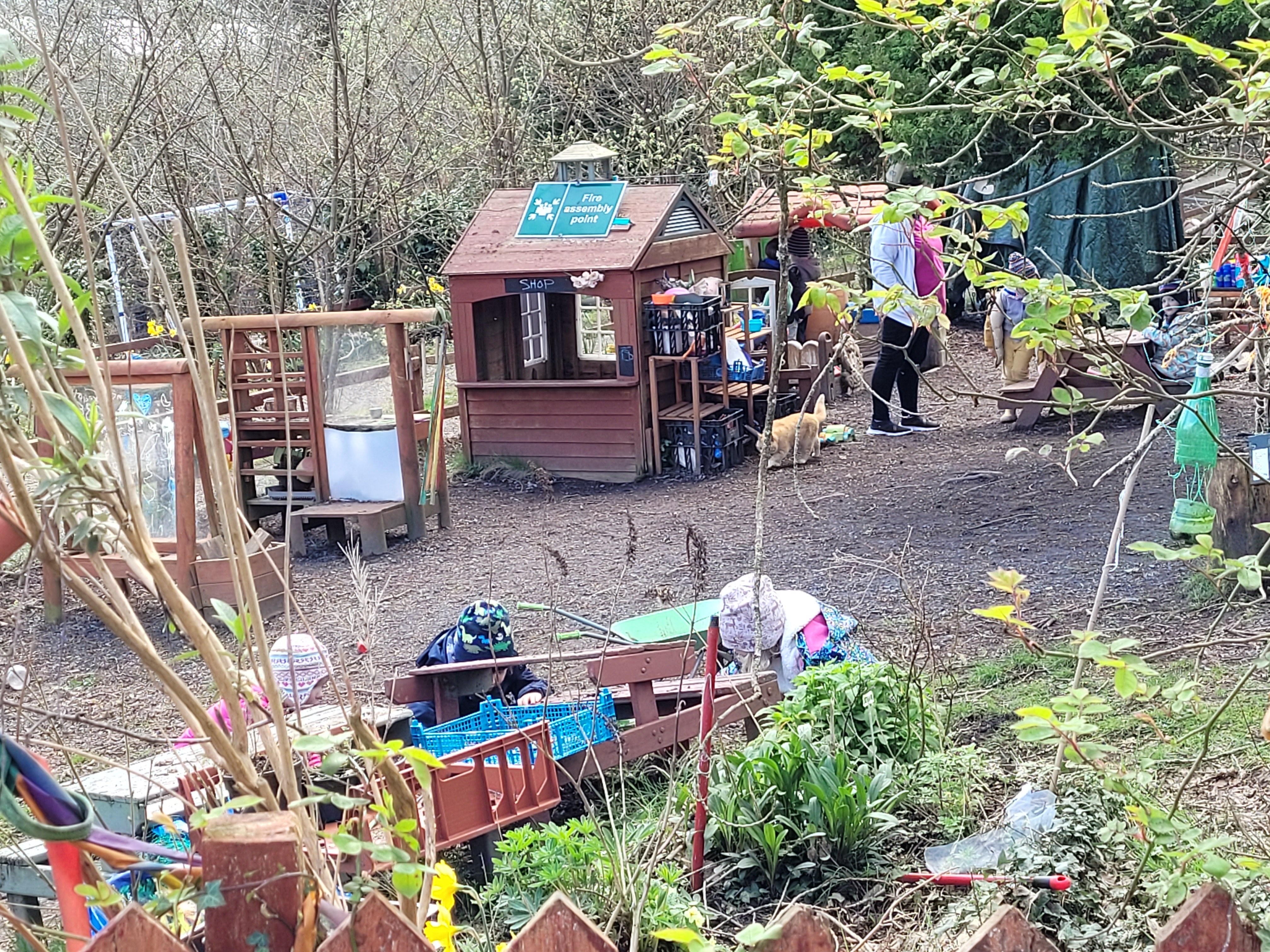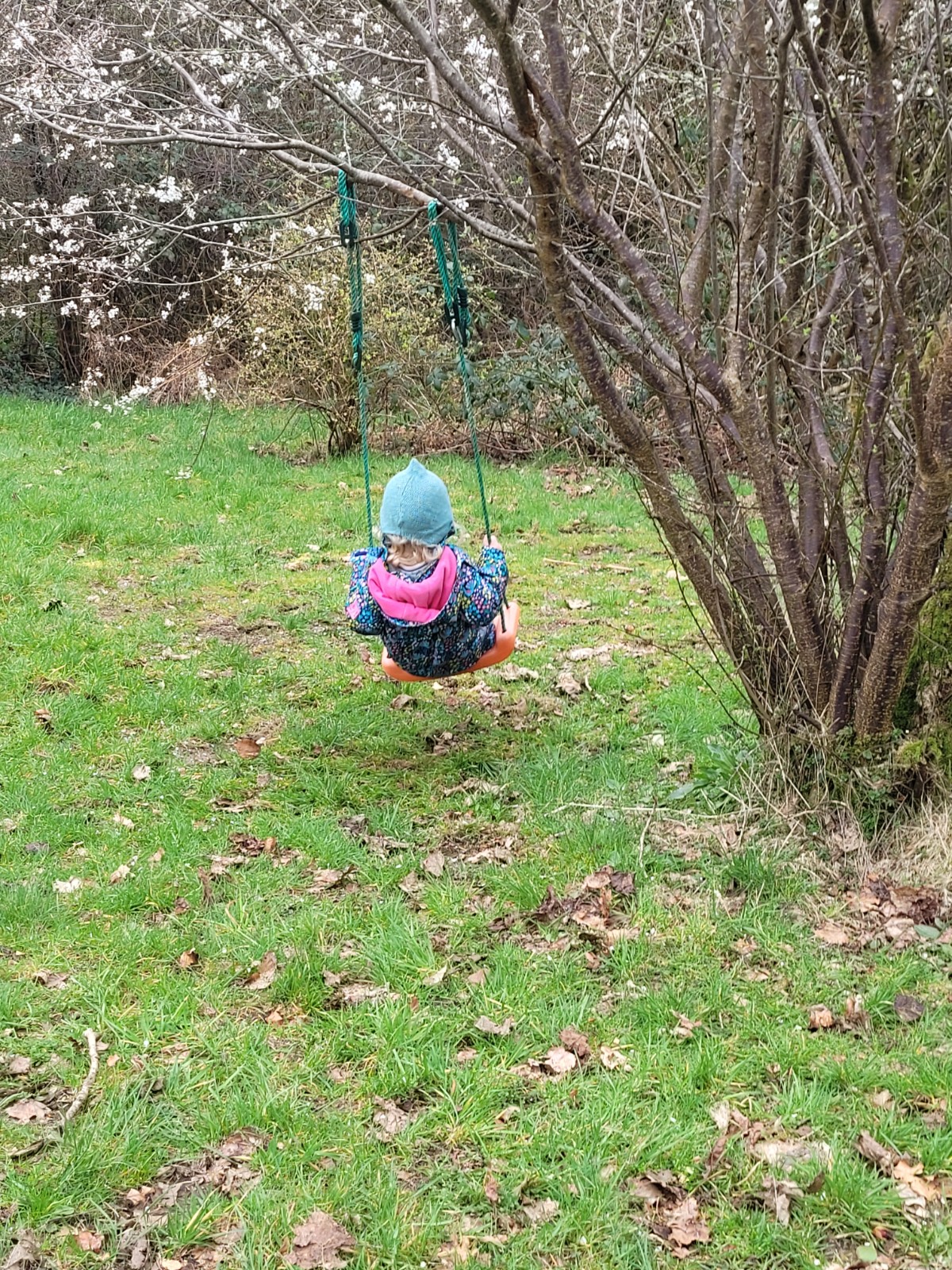Have you ever wondered how an an Aistear run emergent play service might work in early years education?

This 'Ulla Beag' was set up in 2010 as an inclusive green school, with a play-based pedagogy, delivered under the framework of Aistear.
The aim was to provide the experience of an outdoor play environment similar to that in which I grew up; for both my own children and children in the locality as there was no other green school outdoor setting available.
We received our Síolta Quality Framework validation in June 2018 after a three-year programme of process development and introduction of a quality management framework. By adapting a child centred learning approach, we promote a creative learning environment providing equal opportunities for all children.
There is a high value placed on nutritional learning, running the school garden with the children and providing outdoor play experiences.
Aistear for us is ever evolving allowing us to follow the interests of the child through this emergent curriculum. The interests of the children are paramount, and they influence our long term, short term and day to day planning which involves children’s input.
While sitting outside this morning in the middle of our garden, surrounded by mud kitchen/ fairy garden/ "coffee dock" - whatever the flavour of the day is for the kids and often it is all of those at once; I observe my little group of 11 kids, and search for the words that can truly bring across the importance of including a natural outdoor environment for children's play.
Our setting is based around and in nature. We aim to get out for about 2 hours every day and up to 3.5 hours on drier days. Our indoor area is small and has a huge window to allow us look out if we cannot get out so we can watch snow, hail, sleet whenever our wet gear and wellies are just not enough for the Irish weather.
Based on one acre of land we have a varied environment - the mud garden, fairy garden, planting, campfire, log walk areas, the favourite for the kids are at the entrance of the school. There is also a more structured playground area on the grass with swings; slides; climbing frames - sometimes the children will just want to swing or slide or kick a ball around or perhaps run.
To the back of the school, we have a school garden and a willow and apple orchard walk that comes around from the back to the front of the school.
This year we put up our first polytunnel with the kids and a second one will be up by June. Gardening is such a rewarding experience with children. We sow flowers in tyres; fill every pot we can with seeds; scatter; sow spuds in bags. We also harvest nuts, apples, vegetables, raspberries, strawberries and flowers and seeds with the children and extend the learning by sending seeds, potted plants, fruit, and vegetables home.
Our focus as a green school is on caring - not only caring for each other, but also caring for our environment, learning about biodiversity, being mindful and present in the gardens outside, watching and taking part in growing, recycling, waste management, water conservation, energy management, transport management.
This year we are working on our sixth green flag with An Taisce focusing on Global Litter and Waste management.

What does a day in an Aistear run emergent play service look like?
This morning, sitting in the middle of the group, listening to the birds, feeling the air all around us. I am in the middle of an entire community.
A group of boys have set up a mud coffee dock - they have lined up old plastic beakers ready to go on top of an outdoor tool bench.
A solo drummer is drumming a large plastic drum walking around the little groups and watching what everyone else is doing before he settles on digging with two friends.
Four girls have decided to become "bin men" I did ask are you "bin women" and was told "No only men do this!" - how interesting and observant of them! Their rubbish truck is a garden trolley filled with old kettles, toaster plastic beakers, sticks stone and pieces of wood block cuttings.
A few show interest in what I am doing in the middle of them - but only fleetingly. One asked was I drawing a picture but did not wait for a response.
Another little gardener is checking the worms in the wormery and which plants need watering.
The depth and richness of role play, so important for language and social skills is amazing outdoors -with no restrictions, no boundaries. They gather at a makeshift campsite for break and "roast" marshmallows. Suddenly the coffee dock has turned into a kiddie disco and all go to investigate.
A little robin chirps along to some of the children who are singing here as they 'work'. Sometimes the birds are so loud we just sit or stand close our eyes and see what we can recognise - robins, swallows, coal tits, blue tits.

The Covid-19 pandemic brought challenges for us with the starting and stopping of school, but it also brought some delights.
Due to the quietness on the roads around us a red squirrel mum and baby appeared. Two peregrine falcons are nesting in a neighbouring field and we have on occasion a visit from the dinosaur - a local heron. A duck family moved in behind us to nest and very early some mornings you can see the duck sitting on our roof observing all in front of them. No two days are the same.
To truly observe children at play they must be given the opportunity for free play outdoors.
You can observe all of a child's schemas through digging, gardening, mud kitchen play, role play, swinging, running.
I also firmly believe the only place to remove our internal bias on how children should play is to get outdoors with them.
They will completely involve you in their play - you are on their level, in their zone. You are invited into their world and it is an amazing place to spend a few hours with them.
By adapting Aistear as an emerging play curriculum, we have been able to fully include the children here in our planning both short term and long term, in the design and continual redesign of our outdoor and indoor environments.
Aistear in our outdoor setting has allowed us to participate, learn with and from these children, play and observe children in their element and we can all breathe, create, collaborate, and have fun together.

This is a guest blog post by Portobello Institute Masters in Early Childhood Studies student Denise Sheridan. Pictures by Denise Sheridan and is linked to the 'Distinctive Approaches' module on our master's programme.
Read another blog post on the professionalisation of the early year's sector from master's student Kellie Duggan.
Portobello Institute offers this contemporary Level 9 MA in Early Childhood Studies designed for professional early years practitioners.
Why Study at Portobello Institute?
No matter what level of education you currently hold, Portobello Institute can guide you on your path to gaining a Level 9 in Early Childhood Studies.
Our programmes start at Level 5 and Level 6 ECCE and Montessori. From there you can progress on to your Level 7 BA (Ord) degree. You can add a research project to your Level 7 and make it a BA (Hons) Level 8 and from there move on to your Level 9 all while building relationships with our tutors who will support you every step of the way.
The quality and experience of our tutors means you are learning from people who are qualified and know what they are talking about. You are not just a student number at Portobello, your tutor knows your name.
Portobello Institute offers blended learning options so you can study online from anywhere in the world at times that suit you and your work/family life.
We have small class sizes and one-on-one tutor support to help make your goals accessible to you.
We know that funding and the cost of education is a barrier for many people. We have set up easy payment plans so you can spread the cost over time.
Portobello Institute is the leading provider in early years education in Ireland with 40 years of experience.
Click here to book a consultation to speak to our Early Years & Montessori advisor, Jennifer Matteazzi, about where you are on this journey and how we can guide you to achieve your goals. Call her directly on 01 892 0031 or email jennifer.matteazzi@portobelloinstitute.com.




.png?width=352&name=Untitled%20design%20(2).png)
.png?width=352&name=Fashion%20(37).png)